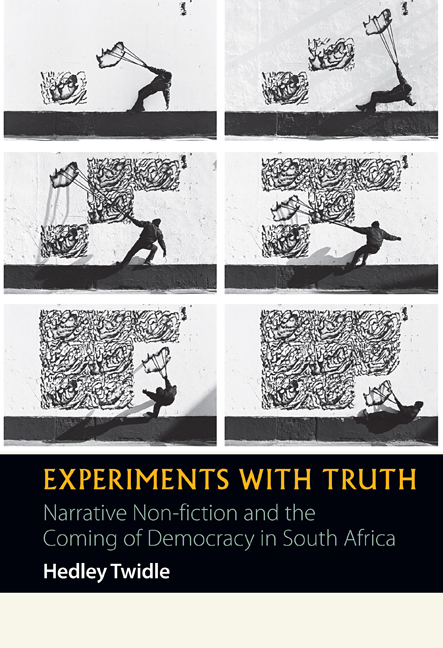Book contents
- Frontmatter
- Contents
- Preface: Encountering non-fiction
- 1 Introduction: Historical and theoretical approaches
- 2 Unusable pasts: The secret history of Demetrios Tsafendas: assassin, madman, messenger
- 3 Literatures of betrayal: Confession, collaboration and collapse in post-TRC narrative
- 4 In search of lost archives: Nostalgia, heterodoxy and the work of memory
- 5 A very strange relationship: Ambition, seduction and scandal in post-apartheid life writing
- 6 Some claim to intimacy: Political biography and the limits of the liberal imagination
- 7 In short, there are problems: Literary journalism in the postcolony
- 8 Unknowable communities: Necessary fictions and broken contracts in the heart of the country
- 9 A new more honest code: Memoirs of the ‘born frees’ and the futures of non-fiction
- 10 Afterword: The extracurriculum
- Bibliography
- Index
- Miscellaneous Endmatter
6 - Some claim to intimacy: Political biography and the limits of the liberal imagination
Published online by Cambridge University Press: 11 September 2020
- Frontmatter
- Contents
- Preface: Encountering non-fiction
- 1 Introduction: Historical and theoretical approaches
- 2 Unusable pasts: The secret history of Demetrios Tsafendas: assassin, madman, messenger
- 3 Literatures of betrayal: Confession, collaboration and collapse in post-TRC narrative
- 4 In search of lost archives: Nostalgia, heterodoxy and the work of memory
- 5 A very strange relationship: Ambition, seduction and scandal in post-apartheid life writing
- 6 Some claim to intimacy: Political biography and the limits of the liberal imagination
- 7 In short, there are problems: Literary journalism in the postcolony
- 8 Unknowable communities: Necessary fictions and broken contracts in the heart of the country
- 9 A new more honest code: Memoirs of the ‘born frees’ and the futures of non-fiction
- 10 Afterword: The extracurriculum
- Bibliography
- Index
- Miscellaneous Endmatter
Summary
‘When I saw that the Wits Great Hall was the venue for the launch of Mark Gevisser's biography of Thabo Mbeki’, wrote a journalist for the Sunday Independent in November 2007, ‘I feared that he and his publisher might be being a trifle overambitious’ (Gordin 12). Yet the central venue of the University of the Witwatersrand in Johannesburg was full to capacity well before the start, with over 1,000 people crammed in for a presentation and panel discussion, and many more turned away. Gevisser was ‘feted in a manner reminiscent of a pop star rather than an earnest writer’, his 900-page life of the president, eight years in the making, emerging to huge national and then international acclaim (Saunderson-Meyer 13). The Times Literary Supplement judged it ‘probably the finest piece of non-fiction to come out of South Africa since the end of apartheid’ (Plaut, online).
Published at a moment that marked the onset, according to some, of a more difficult and fractious ‘second transition’ in South Africa, and one characterised by non-fictional registers of ‘surprise, shock, bewilderment’ (McGregor and Nuttall, At Risk 10), Thabo Mbeki: The Dream Deferred was a book accorded an enormous, perhaps unrealistic explanatory power. A general enthusiasm for biography as a genre had fused with a deep hunger among South Africa’s political class, intelligentsia and the book-buying public to puzzle out the country's predicament via Mbeki's complex and contested career. As the figure who had done most to initiate and maintain negotiations with white South Africa's elites under apartheid, and then served under Nelson Mandela as a de facto prime minister, Thabo Mbeki might be seen, his biographer suggested, as ‘the primary architect of South Africa's transition to democracy’ (A Legacy of Liberation 1).
At the Johannesburg launch, Gevisser gave a presentation based on the photographs included in the book, images that drew expressions of surprise and delight from the crowd. For a South African public more familiar with the Zapiro cartoons depicting Mbeki as an impassive, pipe-smoking technocrat, they are startling pictures. We see him as a confident student leader in Dar es Salaam and then at Sussex University, posing with his bohemian English girlfriend; as a composed young revolutionary leading a march from Brighton to London to protest against the sentencing of his father and other Rivonia trialists in June 1964;
- Type
- Chapter
- Information
- Experiments with TruthNarrative Non-fiction and the Coming of Democracy in South Africa, pp. 123 - 140Publisher: Boydell & BrewerPrint publication year: 2019

